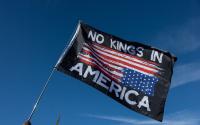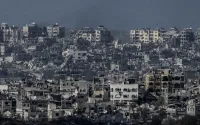15 October 2007Planet ArkAlister Doyle
"I hope this will enhance further a sense of urgency," said Yvo de Boer, the head of the UN Climate Change Secretariat who wants governments to set an end-2009 deadline to work out a new long-term plan to fight global warming.
The secretive Nobel committee, making a first award clearly linking climate change to peace since the prize was set up in 1901, said on Friday: "Action is necessary now, before climate change moves beyond man's control."
The prize to Gore and the UN's Intergovernmental Panel on Climate Change (IPCC) which has issued reports this year outlining risks of global warming, partly targets the world's environment ministers who will meet in Bali from Dec. 3-14.
The United Nations and the Group of Eight industrialised countries want them to agree a 2-year negotiating mandate to broaden the UN's Kyoto Protocol, the main plan for curbing warming, to outsiders such as the United States and China.
By coincidence, the Nobel Prize will be handed out in a ceremony in Oslo on Dec. 10 -- and so gives both Gore and Rajendra Pachauri, chairman of the IPCC, a new stage to urge action. Both Pachauri and Gore were already due to visit Bali.
But not everyone was convinced by a prize that seemed a slap at US President George W. Bush, who narrowly beat Gore in the 2000 presidential election. Gore has since campaigned for more action to slow global warming.
A spokesman for Czech President Vaclav Klaus, for instance, said he was "somewhat surprised that Al Gore got the Peace Prize, because the relation between his activities and world peace is unclear and indistinct."
KYOTO NO
Bush decided not to implement Kyoto -- favoured by Gore -- in 2001 when he decided that its curbs would cost US jobs and that it unfairly omitted 2012 targets for developing nations. Until now he has favoured voluntary measures.
Broadening a definition of peace, the Nobel Committee said "there may be increased danger of violent conflicts and wars," because of tensions over ever scarcer resources caused by more floods, droughts, desertification and rising seas.
"We face a true planetary emergency," Gore said on Friday. Such theories are not universally accepted, especially in the United States.
Stein Toennesson, head of the International Peace Research Institute in Oslo said that climate change might lead to conflicts but "it could just as well lead to more cooperation."
Many experts say that creeping desertification, linked to climate change, is an underlying spur to the conflict in Darfur, Sudan, where 200,000 people have died.
"The Nobel Peace Prize Committee has today made it clear that combating climate change is a central peace and security policy for the 21st century," said Achim Steiner, head of the UN Environment Programme.
The IPCC said this year that it was "very likely" or at least 90 percent certain that humanity was to blame for global warming, mainly by burning fossil fuels. And it said time was running short for action that would have moderate costs.
The secretive five-strong committee made a first environmental award in 2004, to Kenya's Wangari Maathai for leading a campaign to plant 30 million trees across Africa.
"Now, we have started a small road, a path when it comes to environment," committee chairman Ole Danbolt Mjoes said, noting that the prize had been widened to new areas such as human rights over the years.
(With additional reporting by Wojciech Moskwa and Aasa Christine Stoltz in Oslo, Jeremy Lovell in London)






